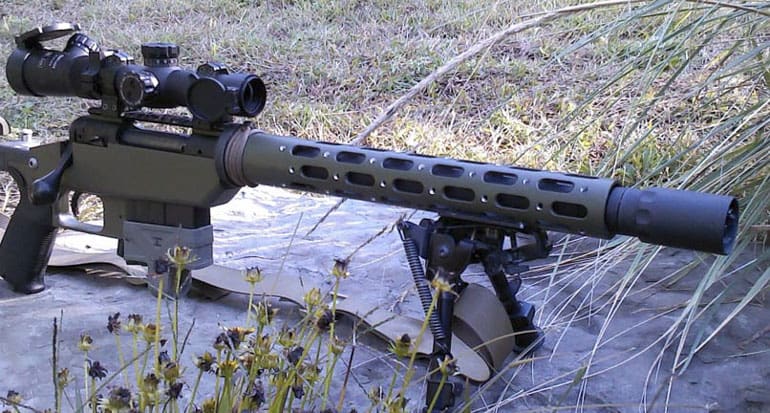I know a longer barrel improves accuracy, but is there more to it (as in bullet stabilization) than just the ability of the shooter to deal with barrel length? Some people can shoot a snubbie with accuracy, while most probably cannot. Does the longer barrel, at handgun length, improve accuracy even for those who can shoot a snubbie accurately?
You are using an out of date browser. It may not display this or other websites correctly.
You should upgrade or use an alternative browser.
You should upgrade or use an alternative browser.
Does less barrel length = less accuracy due to the shooter, or the barrel? (pistol length)
- Thread starter Baccusboy
- Start date
The #1 community for Gun Owners of the Northeast
Member Benefits:
No ad networks! Discuss all aspects of firearm ownership Discuss anti-gun legislation Buy, sell, and trade in the classified section Chat with Local gun shops, ranges, trainers & other businesses Discover free outdoor shooting areas View up to date on firearm-related events Share photos & video with other members ...and so much more!
Member Benefits:
- May 29, 2017
- 7,741
Shorter barrel makes the recoil snappier. It takes a bit longer to get the aim point back to target. That's my perception.
RoadDawg
Nos nostraque Deo
- Dec 6, 2010
- 94,397
Shorter barrel with shorter sight radius makes it more difficult to hold true aim point. Bad shooters will become more obvious. Their lack of control will be more exaggerated. Good/better shooters will normally be able to compensate.
Longer barrel makes higher pressures. That effects bullet speed and travel.
IANABE
Longer barrel makes higher pressures. That effects bullet speed and travel.
IANABE
- Feb 17, 2011
- 14,024
All guns come down to practice. Lets use a 1911 as an example, USGI may be your gun and you can shoot it well but step into say a Kimber or any other 1911. Each gun has a personality of its own, usually higher end guns try and build the "personality" out so each gun made is close to the others made. It really comes down to what you are used to. Some that shoots snubbies all the time will usually out perform a novice because of the idiosyncrasies that may be inherent to snubbies. I can shoot my M&P9 better than I can Glock 17, the glock is superb gun but I do not have a lot of time on one.
Boats
Broken Member
Barrel length does not directly affect accuracy.
The shorter sight radius that comes from running a shorter barrel does.
A shorter barrel reduces velocity and shortens the effective range, and reduces accuracy at range because the bullet will drop to subsonic speeds sooner (when a bullet goose trans-sonic accuracy is affected)
TTAG did a scientific test where a barrel was shortened in increments from 26" to 13.5" and test fired. There was actually a slight increase in accuracy as the barrel got shorter due to harmonics.

 www.thetruthaboutguns.com
www.thetruthaboutguns.com
The shorter sight radius that comes from running a shorter barrel does.
A shorter barrel reduces velocity and shortens the effective range, and reduces accuracy at range because the bullet will drop to subsonic speeds sooner (when a bullet goose trans-sonic accuracy is affected)
TTAG did a scientific test where a barrel was shortened in increments from 26" to 13.5" and test fired. There was actually a slight increase in accuracy as the barrel got shorter due to harmonics.

The Truth About Barrel Length, Muzzle Velocity and Accuracy - The Truth About Guns
◀Previous Post Next Post▶ Josh Wayner’s taken it upon himself to challenge what everyone “knows” as far as barrel length, velocity and accuracy are concerned. According to his results, the conventional wisdom ain’t all that wise when it comes to longer-barreled ballistics. The only question...
 www.thetruthaboutguns.com
www.thetruthaboutguns.com
smokey
2A TEACHER
- Jan 31, 2008
- 31,509
A shorter barrel is actually more rigid than a longer barrel at a given diameter and therefore easier to make "accurate". As mentioned above, this comes at a cost of velocity and you may also get more inconsistent powder burn depending on how short the barrel is.
In practice for a pistol, shorter barrels mean a shorter sight radius, which amplifies any error in alignment the further out you go. The good news is that micro red dot optics now exist that present the same aiming solution for any barrel length.
That just leaves you with the frame of the gun itself and handling characteristics. Smaller slides usually mean smaller grips. This reduces your control surfaces and makes the act of handling and aiming the gun more difficult. They also recoil more because F(net)=MA. So firing them quickly may be more difficult.
On it's own though, outside of velocity and consistent powder burn, there's not much barrel length has to do with accuracy.
In practice for a pistol, shorter barrels mean a shorter sight radius, which amplifies any error in alignment the further out you go. The good news is that micro red dot optics now exist that present the same aiming solution for any barrel length.
That just leaves you with the frame of the gun itself and handling characteristics. Smaller slides usually mean smaller grips. This reduces your control surfaces and makes the act of handling and aiming the gun more difficult. They also recoil more because F(net)=MA. So firing them quickly may be more difficult.
On it's own though, outside of velocity and consistent powder burn, there's not much barrel length has to do with accuracy.
Most short barrel handguns tend to have smaller grips, lousy sights (and short sight radius), and often very heavy triggers.
In a more apples-to-apples comparison, I had little difference in practical accuracy shooting a 2.5" bbl 66 combat magnum and a 4" 625. Both had respectable frame and grip sizes, fully adjustable sights of good quality, and had the actions either performance center tuned (625) or tuned after purchase (66). Under time pressure, the shooters ability to comfortably manipulate the weapon is key to accuracy and even with medium small hands I find a j frame (or most subcompact autos) to require much more concentration to establish a good grip and shoot with precision than their larger relatives.
In a more apples-to-apples comparison, I had little difference in practical accuracy shooting a 2.5" bbl 66 combat magnum and a 4" 625. Both had respectable frame and grip sizes, fully adjustable sights of good quality, and had the actions either performance center tuned (625) or tuned after purchase (66). Under time pressure, the shooters ability to comfortably manipulate the weapon is key to accuracy and even with medium small hands I find a j frame (or most subcompact autos) to require much more concentration to establish a good grip and shoot with precision than their larger relatives.
Less weight may also contribute to less control.
Multiple factors, nearly impossible to say which factor is dominate.
Multiple factors, nearly impossible to say which factor is dominate.
In most cases the short sight radius dominates. Even most relatively good shooters are going to shoot a gun with a longer sight radius more accurate all else being equal. It might be a small difference, or it might not be. For instance, I've shot a 10/22 with a front aperture sight and one with rear tech sights. They were very, very similar sights, but of course the tech sights had roughly double the sight radius. I consider myself a very good from a bench, okay field/off hand shooter. Anyway, at 50yds, my groups were easily 1MOA better with the tech sights than the forward aperture. A scope was more accurate still, but the longer sight radius certainly helped me be more accurate, and more accurate faster.Less weight may also contribute to less control.
Multiple factors, nearly impossible to say which factor is dominate.
On handguns, shooting a 6" revolver with similar sights to a 2", yeah, I am a little more accurate faster with the 6". At practical distances it doesn't matter much. At long distances it does. At shorter distances it isn't like it makes much difference. That snubbie I might shoot 4" groups at 12yds and the 6" might be just a little better. A 25yds yds, the difference in sight radius is more noticeable. At 50yds? Huge difference IMHO. Just like when I swap back and forth between a G19 and a G34 both with irons at 50yds. Shooting clays off the berm, the G34 I can manage about 40-50% hits on clays on the berm off hand shooting. G19? Maybe 25%?
Maybe that makes me a mediocre shooter, but my practical accuracy is significantly enhanced with a longer sight radius.
So long as the barrel is long enough to stabilize the bullet (and that can happen), it is long enough to be mechanically accurate. At long distances (speaking of rifles), a longer barrel can be more accurate because of environmental factors. A 26" .308 is going to have very significantly higher velocity than a 14.5" .308. The shorter barrel is easier to make mechanically accurate because of harmonics. However, that 26" is going to have a much longer maximum point blank range, giving higher practical accuracy at range. And at longer ranges, wind will have significantly less impact on the bullet from the 26" also.
Not that one normally shoots them at very long range, but a 4" stocked PCC vs a 16" PCC, the 16" is going to have a lot better practical accuracy (say at 150yds) because of much higher velocity and, depending on design, a lot longer sight radius.
- Jul 29, 2014
- 49,999
^^^This. There are way too many variables to render any argument absolute. Even when comparing apples to apples. A quality pistol will outperform a poorer quality gun of the same caliber and barrel length in most cases. If you're talking personal defense guns, how accurate will it need to be?Less weight may also contribute to less control.
Multiple factors, nearly impossible to say which factor is dominate.
Hunting pistols, different story.
Last edited:
Boats
Broken Member
Paul Harrell also covered this concept
Rifles introduce even more variables. Likely most important is whether you are shooting standard ammo or subsonic. Shooting standard introduces the super sonic to sub sonic transition and the likely lack of accuracy this introduces - at the point of transition. As the video above demonstrates, longer barrels with higher initial velocity are going to have that transition at greater distance, shorter barrels are going to have the transition closer in. The video above doesn't touch a possible variable affecting his demonstration: barrel profile.
All moot and irrelevant to the original question.
All moot and irrelevant to the original question.
Crosseye Dominant
Ultimate Member
- Sep 1, 2018
- 1,023
When Glock first started using dual recoil springs on their sub-compacts like the 26 and 30, they did seem to print tighter than the bigger Glocks if you really took the time to line up the sights. Obviously practical accuracy at speed you lost that advantage due to sight radius, but now red dots are helping that out. I wish they would make a Glock 30 with a full size grip... That would be badass.
- Feb 4, 2013
- 28,175
Longer barrel makes higher pressures. That effects bullet speed and travel.
WTF?!. How does a longer barrel make higher pressures?
Have you ever looked a pressure versus time chart? Highest pressure is right after ignition. Then pressure falls the entire rest of the time the bullet is in the barrel.
Yes VELOCITY increases, as the pressure is working on the bullet longer. Unless the powder charge is such that the pressure falls enough that the bullet starts to slow down. This happens with .22LR in rifle barrels.
For me, a short polymer frame pistol (like what I carry) is just fine even well beyond likely practical differences. But putting it down and picking up a full sized pistol with a steel frame: longer sight picture sure helps, but also the extra mass. Not because of recoil per se, but because all that inertia means I’m not wiggling the gun nearly so much, especially when winded with my heart up. It’s tangible. And, I’ve got big hands, so a full sized grip just works better if you’re getting off more than one round.
RoadDawg
Nos nostraque Deo
- Dec 6, 2010
- 94,397
So…WTF?!. How does a longer barrel make higher pressures?
Have you ever looked a pressure versus time chart? Highest pressure is right after ignition. Then pressure falls the entire rest of the time the bullet is in the barrel.
Yes VELOCITY increases, as the pressure is working on the bullet longer. Unless the powder charge is such that the pressure falls enough that the bullet starts to slow down. This happens with .22LR in rifle barrels.
The 1.75 inch barrel of a snub nose .38, is going to allow the same pressures to build up behind the bullet before it leaves the barrel, as a 10 inch barrel of a semi auto SBR?
Tell us all how the unburned powder which can be seen in slow motion photography as it leaves that short barrel behind the bullet, is ever utilized like the powder which actually gets burned when the same bullet stays in the longer barrel for more time.
Unburned powder = wasted powder = less pressure.
Complete burn = more force = higher sustained pressure.
ianakia
smokey
2A TEACHER
- Jan 31, 2008
- 31,509
I think he's referring to peak pressure, which happens very early on in internal ballistics. Velocity is a result of a pressure differential accelerating the projectile for a longer duration. Peak pressure isn't higher in a longer barrel.So…
The 1.75 inch barrel of a snub nose .38, is going to allow the same pressures to build up behind the bullet before it leaves the barrel, as a 10 inch barrel of a semi auto SBR?
Tell us all how the unburned powder which can be seen in slow motion photography as it leaves that short barrel behind the bullet, is ever utilized like the powder which actually gets burned when the same bullet stays in the longer barrel for more time.
Unburned powder = wasted powder = less pressure.
Complete burn = more force = higher sustained pressure.
ianakia
That unburned powder you mention is one of the reasons I mentioned that longer barrels can have more consistent powder burn(and therfore velocity) in comparison to a shorter barrel.
Users who are viewing this thread
Total: 2 (members: 0, guests: 2)
Forum statistics
Latest threads
-
Just want to thank the extremely awesome folks at Tyler Firearms (5 Viewers)
- Started by GenoBluzGtr
- Replies: 4
-
-
Clearance Liqui Moly Motorbike 4T SAE 15W-50 Street | Full Synthetic Motor Oil | 4 Liter (3 Viewers)
- Started by mpollan1
- Replies: 3
-
-
-
-

